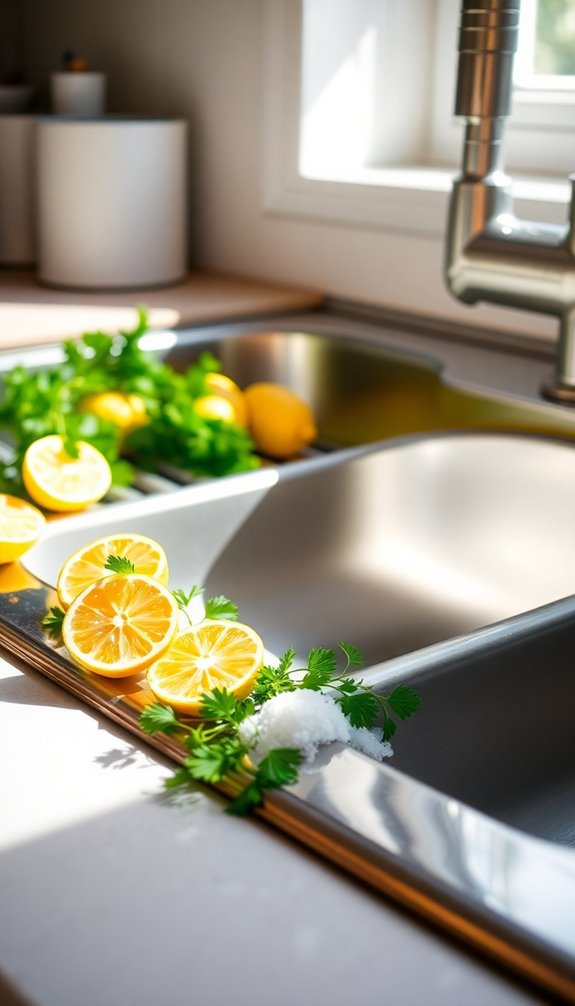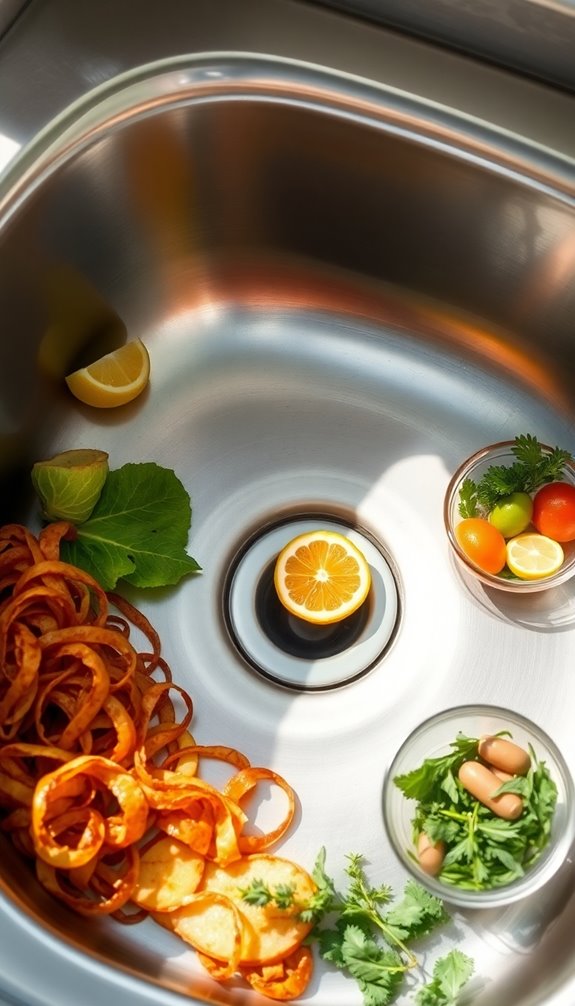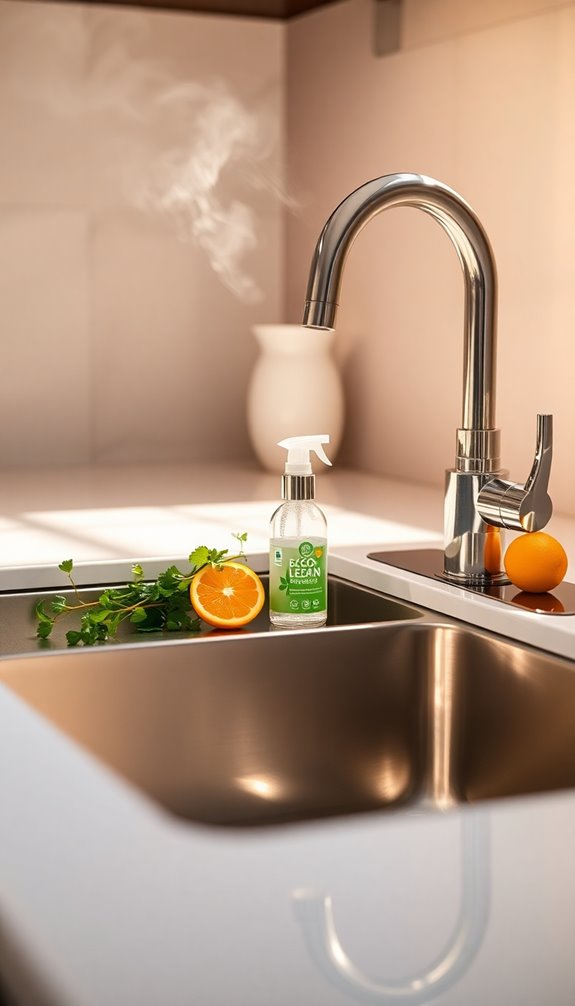To keep your kitchen sink smelling fresh, establish a regular cleaning routine for your garbage disposal. Avoid putting oils, fats, and fibrous foods down the drain, as they lead to clogs and odors. Clean your disposal monthly using natural remedies like baking soda and vinegar or by grinding citrus peels. Always flush with cold water while using the disposal to push food particles through. Additionally, consider using a D-Limonene cleaner weekly for extra freshness. With these simple tips, you can maintain a pleasant kitchen environment. For even more effective strategies, there's plenty more to explore.
Causes of Garbage Disposal Odors
Garbage disposal odors often stem from the buildup of food scraps and waste that accumulate over time, leading to unpleasant smells if you don't address them quickly.
One major contributor to these garbage disposal smells is food particles that get trapped and decay. You might notice that certain items, like meats and stringy vegetables, can lead to particularly smelly food situations. If you regularly toss these into your disposal, you're setting yourself up for odors that linger. Regular cleaning of your disposal can significantly reduce these odors. Additionally, neglecting to clean your disposal can lead to the accumulation of harmful bacteria that further exacerbates the smell.
Another culprit is grease and oil, which can solidify and create clogs. These blockages not only contribute to the stench but can also lead to more severe plumbing issues. If you don't maintain your disposal and clean it frequently, you're likely exacerbating the smell problems you're encountering.
To eliminate odors effectively, act quickly when you detect any unpleasant scents. Regular cleaning can prevent the buildup of waste and food particles that lead to those foul smells. Additionally, adopting preventive measures like sealing gaps can help reduce grease accumulation around your disposal.
It's essential to stay vigilant and address any issues promptly to keep your kitchen sink smelling fresh and inviting.
Preventive Measures for Freshness
To keep your garbage disposal fresh, establish a regular cleaning routine to eliminate food scraps that can cause odors. You should also manage food waste effectively by avoiding certain items that lead to clogs. Implementing odor prevention techniques, like using citrus peels, can make a big difference in maintaining a pleasant kitchen environment. Additionally, incorporating natural cleaning solutions can enhance the freshness of your disposal and reduce reliance on harsh chemicals. Regularly cleaning drain screens to catch food particles before they enter drains is another effective way to prevent unpleasant smells and clogs. Using baking soda and vinegar as a cleaning solution can provide a deep clean and eliminate odors effectively.
Regular Cleaning Routine
Maintaining a regular cleaning routine for your kitchen sink can greatly enhance freshness and prevent unpleasant odors. You should aim to clean your garbage disposal at least once a month. This prevents the buildup of smelly food scraps that can linger and spoil your kitchen environment.
While using the disposal, run cold water to flush food particles effectively. This helps reduce odors by preventing grease from solidifying and causing clogs. Be cautious about what you dispose of; avoid putting oils, fats, and strong-smelling items like meats and fibrous vegetables down the disposal, as these can lead to unpleasant smells.
Incorporate natural deodorizing methods into your routine. Grinding citrus peels can give your disposal a fresh scent, while a mixture of baking soda and vinegar can neutralize odors effectively.
If you notice any foul smells, address them immediately by cleaning the disposal and using baking soda as a natural deodorizer. Regularly cleaning and maintaining your disposal is key to ensuring a clean and fresh kitchen sink, so make it a habit to keep your space smelling pleasant.
Food Waste Management
Effective food waste management is essential for keeping your kitchen sink fresh and odor-free. By taking a few proactive steps, you can greatly reduce the risk of bad smells emanating from your disposal.
Here are three key tips to help you manage food scraps effectively:
- Regular Cleaning: Clean a kitchen sink and your garbage disposal regularly to prevent the buildup of smelly food scraps. This practice keeps odors at bay and maintains peak functioning.
- Use Cold Water: Always run cold water while using the disposal. This helps flush food particles down the drain, reducing the chances of clogs that can lead to unpleasant smells.
- Be Selective with Scraps: Avoid putting oils, fats, and fibrous foods like celery and banana peels down the disposal. These items can cause considerable clogs and contribute to bad smells.
Odor Prevention Techniques
Keeping your kitchen sink fresh often hinges on a few simple odor prevention techniques. Regularly clean your garbage disposal, ideally once a month, to prevent the buildup of smelly food residue.
When you use the disposal, always run cold water to flush away food particles and odors, guaranteeing effective operation and minimizing clogs.
To further eliminate unpleasant smells, avoid putting oils, fats, and certain food items like meats and stringy vegetables down the disposal. These can't only create odors but also lead to blockages.
If you notice any emerging smells, tackle them immediately with a combination of baking soda and White Vinegar. This powerful mix neutralizes odors and cleans the disposal effectively.
Incorporating citrus peels, like lemon or orange, can also work wonders. Not only do they deodorize your garbage disposal, but their antibacterial properties help keep it fresh.
Natural Remedies for Odor Elimination

Often, you might notice unpleasant odors wafting from your kitchen sink's disposal, but natural remedies can help combat these smells effectively. Here are three easy methods to freshen up your disposal:
- Baking Soda & Vinegar: Pour ¼ cup of baking soda followed by 1 cup of vinegar into the disposal. The bubbling action breaks down food particles and eliminates odors. Let it sit for a few minutes, then rinse with hot water. This method is not only effective but also utilizes natural ingredients that are safe for your home.
- Citrus Peels: Grind rinds from oranges, lemons, or limes in the disposal. Not only does this mask odors with a fresh scent, but the antibacterial and antifungal properties of the peels help keep your disposal clean. Additionally, using natural disinfectants can enhance the effectiveness of your cleaning routine.
- Borax: Sprinkle ½ cup of Borax into your disposal weekly. This natural deodorizer greatly reduces unpleasant smells and keeps your kitchen smelling fresh.
Additionally, running hot water with a few drops of dish soap through the disposal helps maintain cleanliness and prevents odor-causing buildups. Incorporating these natural remedies into your routine will keep your kitchen sink smelling delightful! Furthermore, using green cleaning products can enhance your cleaning routine while being eco-friendly.
Benefits of Citrus
Using citrus in your garbage disposal offers fantastic benefits.
The antibacterial properties of citrus fruits like lemons and limes help keep your disposal clean, while grinding peels releases a fresh scent that deodorizes any lingering odors. Additionally, citrus fruits contain natural disinfectants that help eliminate bacteria and enhance the overall cleanliness of your kitchen. Regularly incorporating disinfectant solutions can further boost cleanliness and ensure a hygienic environment.
Plus, the natural acidity cuts through tough grease, enhancing freshness and performance effortlessly. Additionally, incorporating natural ingredients like citrus into your cleaning routine promotes a healthier home environment.
Antibacterial Properties of Citrus
Citrus fruits consistently demonstrate their powerful antibacterial properties, making them a fantastic addition to your kitchen cleaning routine. By incorporating these fruits, you can effectively combat odor-causing bacteria and maintain a fresh scent in your kitchen sink.
Here are three key benefits of using citrus:
- Natural Antibacterial Agents: Citrus fruits like lemons, oranges, and limes contain oils that fight off germs and bacteria. This helps keep your garbage disposal and sink cleaner.
- Grease-Busting Acidity: The acidity in lemon juice breaks down grease and grime, enhancing your cleaning efforts and leaving behind a revitalizing aroma.
- D-Limonene Richness: Citrus rinds are packed with D-Limonene, a compound that eliminates smelly fats and oils, creating a more pleasant environment for your plumbing system.
Regularly using citrus in your cleaning routine can considerably reduce the buildup of odor-causing bacteria, promoting a healthier kitchen.
Deodorizing With Citrus Peels
Harnessing the natural power of citrus peels can transform your kitchen sink into a fresher, more inviting space. When you grind citrus peels, like those from lemons, limes, or oranges, in your garbage disposal, you release their antibacterial and antifungal properties. These natural oils effectively combat odor-causing bacteria, ensuring your sink stays smelling fresh.
Citrus peels not only provide a pleasant aroma but also help break down grease and grime that accumulates over time. The acidity in lemon juice, for instance, cuts through stubborn grease, making it easier to clean your disposal while leaving behind a delightful scent.
By incorporating citrus peels into your cleaning routine, you're taking an eco-friendly approach, as they're biodegradable and free from harsh chemicals. Regularly using citrus peels in your disposal not only enhances kitchen freshness but also reduces the need for synthetic deodorizing products.
This simple practice allows you to maintain a clean and inviting kitchen environment while being kind to the planet. So, the next time you enjoy citrus fruits, don't toss those peels—put them to work for a fresher kitchen sink!
Enhancing Freshness Naturally
The benefits of incorporating citrus into your kitchen cleaning routine go beyond just deodorizing.
Citrus fruits, like lemons and oranges, contain natural antibacterial and antifungal properties that effectively combat odor-causing bacteria in your garbage disposal. By grinding citrus peels, you not only deodorize but also release natural oils that enhance freshness, making your kitchen smell inviting.
Here are three key benefits of using citrus in your disposal:
- Grease Cutting: The acidity of lemon juice helps cut through grease and grime, ensuring that your disposal operates smoothly while minimizing unpleasant odors.
- Blade Maintenance: Regularly adding citrus peels and running water during the process aids in cleaning the blades, helping prevent buildup that can lead to odors.
- Cost-Effective & Eco-Friendly: Incorporating citrus into your cleaning routine isn't only effective but also a budget-friendly and environmentally friendly method to maintain a fresh-smelling kitchen sink.
Items to Avoid in Disposal

When using your kitchen sink disposal, it's crucial to know which items to keep out to avoid costly clogs and unpleasant odors.
First and foremost, steer clear of oils and fats. When these substances cool, they solidify, leading to significant blockages in both the disposal and plumbing. This can result in nasty smells and expensive repairs. Additionally, using natural degreasers can help break down grease and maintain a fresh-smelling disposal. Regular disinfection of surfaces can also contribute to overall home hygiene by eliminating bacteria that may be present.
Next, avoid disposing of meats, whether they're cooked or raw. They can cause odor issues as they decompose, and their fibrous nature can lead to clogs in the disposal.
Similarly, stringy vegetables like celery and onions can wrap around the blades, hindering their effectiveness and potentially causing jams.
You might think banana peels are harmless, but they can strain the disposal's motor as they wrap around the blades. This can lead to mechanical issues over time.
Finally, while many believe eggshells are safe for disposal, they can accumulate and create buildup that leads to clogs and unpleasant odors. Regularly cleaning your disposal with a natural degreaser can help maintain its efficiency and prevent bad smells.
Effective Cleaning Techniques
Keeping your kitchen sink disposal free from problem items is just the first step in maintaining its performance. To keep it clean and invigorating, you can use these effective cleaning techniques:
- Baking Soda and Vinegar: Pour ¼ cup of baking soda followed by 1 cup of distilled white vinegar into the disposal. The bubbling action helps break down grease and food buildup, leaving behind a clean and invigorating smell.
- Ice Cubes: Regularly grind ice cubes in the disposal. This not only dislodges stuck food particles but also helps clean the blades effectively, enhancing overall performance.
- Citrus Peels: Grind lemon or citrus peels in the disposal. They introduce natural antibacterial properties that combat unpleasant smells while infusing a revitalizing scent.
Additionally, don't forget to clean the splash guard with grease-cutting soap and a toothbrush to remove gunk that can contribute to lingering smells.
Flushing the disposal with boiling water is another quick way to loosen food particles and grease, making maintenance easy.
Implement these techniques for a more invigorating kitchen sink disposal!
Tips for Long-Term Maintenance

Maintaining your kitchen sink disposal doesn't have to be a chore; just a few simple tips can keep it running smoothly for years.
Start by cleaning your disposal at least once a month with natural methods like baking soda and vinegar. This will help prevent odor buildup and maintain freshness.
Always run cold water while using the disposal and for at least 10 seconds afterward. This practice flushes food scraps and grease through the plumbing, reducing the chances of clogs.
When feeding food scraps into the disposal, do it gradually. Overloading can hinder effective grinding and lead to issues down the line.
Be mindful of what you dispose of; avoid oils, fats, and fibrous foods, as these can cause significant buildup and unpleasant odors.
For ideal maintenance, consider using a garbage disposal cleaner with D-Limonene twice a week. This citrus-derived cleaner excels at odor elimination and keeps your disposal in top shape.
Conclusion
Keeping your garbage disposal fresh is like tending to a garden; neglect can lead to unpleasant odors that linger. Just as a wilted flower can spoil the beauty of your blooms, a smelly disposal can ruin your kitchen's ambiance. By following preventive measures and using natural remedies, you'll cultivate a fresh environment. Remember, a little care goes a long way. With these tips, your kitchen can thrive, just like a well-watered garden on a sunny day.